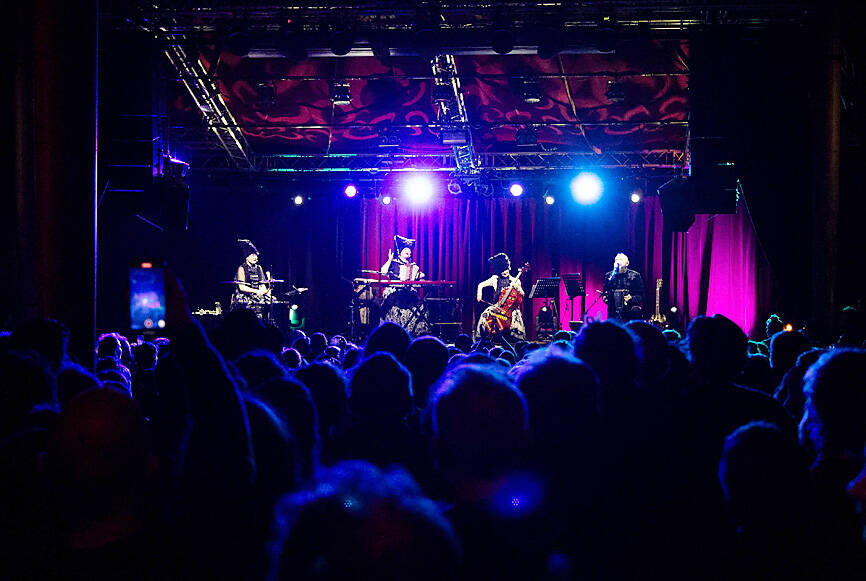A Ukrainian band is treating international audiences to their country’s traditional folk music, spiced up with world music and some rap, with the aim of aiding the struggle against cultural “assimilation” of their country by its neighbor Russia.
Ukraine’s DakhaBrakha ensemble started their performance at the Parisian Cabaret Sauvage with the greeting “Good evening from free Ukraine,” before singer Marko Halanevych, cellist Nina Garenetska, keyboardist Iryna Kovalenko and percussionist Olena Tsybulska launch into the evening’s program.
Wearing identical traditional peasant blouses and layers of necklaces, the group’s three women could pass for sisters. Their tall black hats resembling stove pipes, but are just a fun prop with no actual roots in Ukrainian folklore.

Photo AFP
“We’ve been suffering from Russia’s assimilation policy for three hundred years,” Halanevych said.
After “so many tragic episodes, it’s a miracle that Ukrainian identity, culture and language still exist,” the trained philologist added.
Much of modern Ukraine’s territory was part of the Russian empire under the tsars and then the Soviet Union following the Bolshevik Revolution.

Photo: AFP
Many Western analysts said that Russian President Vladimir Putin long dreamed of absorbing Ukraine into Russian territory even before the February 2022 full-scale invasion.
In conversation, the singer’s fatigue becomes apparent. He admits to being tired, not just from the group’s ongoing tour taking it to France, Switzerland and Luxembourg, but also from the strain brought on by Russia’s war on his country.
DakhaBrakha’s concerts are interspersed with reminders of the conflict, and part of the proceeds go to the national war effort.
“We are aware of course that people in Europe are tired of hearing about it,” Halanevych said. “We understand, and we don’t judge.”
After a two-year break due to the Russian invasion, DakhaBrakha, which has been around for two decades, resumed touring, mostly abroad, but sometimes at home.
Last spring, the quartet performed in Dnipro in the east of the country — where the gig was interrupted three times by air raid sirens — as well as in Chernivtsi, Odesa and Vinnytsia. Next month, it is planning its first studio session since 2020 in Kyiv, which they called “an important and symbolic choice” of location.
The folkloric repertoire has seen a resurgence in Ukraine over the past decades, with ethnomusicologists often recording elderly women to preserve the heritage as faithfully as possible.
However, DakhaBrakha is not shy about lacing central European polyphonic traditions with thumping bass lines, distorted electric guitars and vocal lines akin to rapping.
Their concerts, which have taken them across Europe, the US, Canada, Australia and New Zealand, sometimes have moments of “disconnect” as news from home abruptly bursts into joyful performances with alarm signals from Ukraine flashing up on their smartphone apps.
“Each time we worry about our loved ones,” Halanevych said.
The quartet’s front man is the first to acknowledge that weaponizing music might not be enough of a contribution to the war effort indefinitely, given that Ukraine is finding it increasingly difficult to recruit soldiers.
“We may need more people to take up arms or dig trenches,” he said. “I am ready to defend my country.”
Halanevych’s brother Taras, 37, a journalist and sound engineer, began his military training last month.

Drug lord Jose Adolfo Macias Villamar, alias “Fito,” was Ecuador’s most-wanted fugitive before his arrest on Wednesday, more than a year after he escaped prison from where he commanded the country’s leading criminal gang. The former taxi driver turned crime boss became the prime target of law enforcement early last year after escaping from a prison in the southwestern port of Guayaquil. Ecuadoran President Daniel Noboa’s government released “wanted” posters with images of his face and offered US$1 million for information leading to his capture. In a country plagued by crime, members of Fito’s gang, Los Choneros, have responded with violence, using car

CYBERCRIME, TRAFFICKING: A ‘pattern of state failures’ allowed the billion-dollar industry to flourish, including failures to investigate human rights abuses, it said Human rights group Amnesty International yesterday accused Cambodia’s government of “deliberately ignoring” abuses by cybercrime gangs that have trafficked people from across the world, including children, into slavery at brutal scam compounds. The London-based group said in a report that it had identified 53 scam centers and dozens more suspected sites across the country, including in the Southeast Asian nation’s capital, Phnom Penh. The prison-like compounds were ringed by high fences with razor wire, guarded by armed men and staffed by trafficking victims forced to defraud people across the globe, with those inside subjected to punishments including shocks from electric batons, confinement

The team behind the long-awaited Vera Rubin Observatory in Chile yesterday published their first images, revealing breathtaking views of star-forming regions as well as distant galaxies. More than two decades in the making, the giant US-funded telescope sits perched at the summit of Cerro Pachon in central Chile, where dark skies and dry air provide ideal conditions for observing the cosmos. One of the debut images is a composite of 678 exposures taken over just seven hours, capturing the Trifid Nebula and the Lagoon Nebula — both several thousand light-years from Earth — glowing in vivid pinks against orange-red backdrops. The new image

Canada and the EU on Monday signed a defense and security pact as the transatlantic partners seek to better confront Russia, with worries over Washington’s reliability under US President Donald Trump. The deal was announced after a summit in Brussels between Canadian Prime Minister Mark Carney and European Commission President Ursula von der Leyen and European Council President Antonio Costa. “While NATO remains the cornerstone of our collective defense, this partnership will allow us to strengthen our preparedness ... to invest more and to invest smarter,” Costa told a news conference. “It opens new opportunities for companies on both sides of the